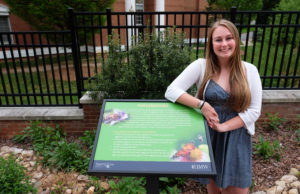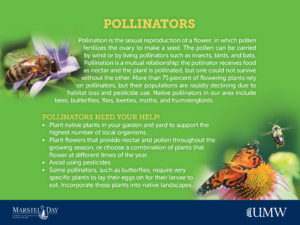With spring finally popping up at the University of Mary Washington, so are the bold buds and blooms of our native plants – purple phlox, golden coneflowers, blue false indigo. Campus is bursting with bright colors made even more vivid by the hard work of a student determined to have her voice heard.

“Pollinators are in decline, and that’s a big topic in the environmental science and conservation world right now,” said UMW senior Maggie Magliato, who is raising awareness on the Fredericksburg campus.
This spring, for the first time ever, a bumblebee was added to the United States list of endangered species. The rusty patched bumblebee, whose population has plummeted nearly 90 percent since the late 1990s, according to a recent National Geographic article, is facing extinction. The dominant cause for the decline is habitat loss.
Magliato, a biology and environmental studies major, has brought the battle to empower the pollinators to UMW. On April 20, just in time for Mary Washington’s Earth Day celebration, she launched the “pollinator walk.” The interactive experience – five colorful signs strategically placed along Campus Walk – gives students, faculty, staff and the entire community the opportunity to learn about the process of pollination and the importance of native plants.
The continuing decline of pollinators – like the rusty patched bumblebee and other animals, including birds, butterflies, moths, wasps, beetles and bats that cause plants to make fruits and seeds – is due in part to urban development. Using insecticides and mowing down fields instead of letting them flourish can lead to habitat loss.
As such, three of the five signs on Magliato’s pollinator walk designate “no mow zones,” where the grass stays tall at all times. The remaining two signs highlight the importance of pollinators, our native eco systems and how we can help.
“Species are going extinct every day due to human impact,” Magliato said. “I strive to prevent that as much as possible by educating people and making a difference.”
During her time at Mary Washington, Magliato earned two grants – a “Go Green” grant from the food services and facilities management company Sodexo and an Innovation in Environmental Stewardship Award from the natural resource and environmental consulting firm Marstel-Day – that would make her dreams grow.
“I want to be active in protecting the world we live in, and that includes our campus,” said Magliato. “Applying for those grants was a way to leave my footprint behind.”
With the funds from the grants, Magliato’s original idea of planting a pollinator garden on the Mary Washington campus blossomed into a plan to create an active learning experience.
“We thought we could enact more change and benefits through teaching people,” Magliato said. “We wanted to highlight the native plants that we already have established on campus and tell people how they can also help.”
Joni Wilson, UMW’s longtime director of landscape and grounds, was excited to have a hand in the pollinator walk project and an opportunity to embrace student involvement.
“Working with Maggie I learned even more,” Wilson said. “I never cease to be impressed with the students’ knowledge, commitment and willingness to work hard to improve not only UMW, but their world.”
Designed to be experienced individually or together, the signs that make up the pollinator walk turned out to be everything Magliato imagined. She hopes one day she’ll return to campus to find her project expanded by other Mary Washington students with similar passions.
“It’s really cool knowing that I will be leaving this project as my legacy here at Mary Washington,” Magliato said. “Knowing that I’ll be able to come back and see that it inspired more environmentalists to attend this school is a great feeling.”


